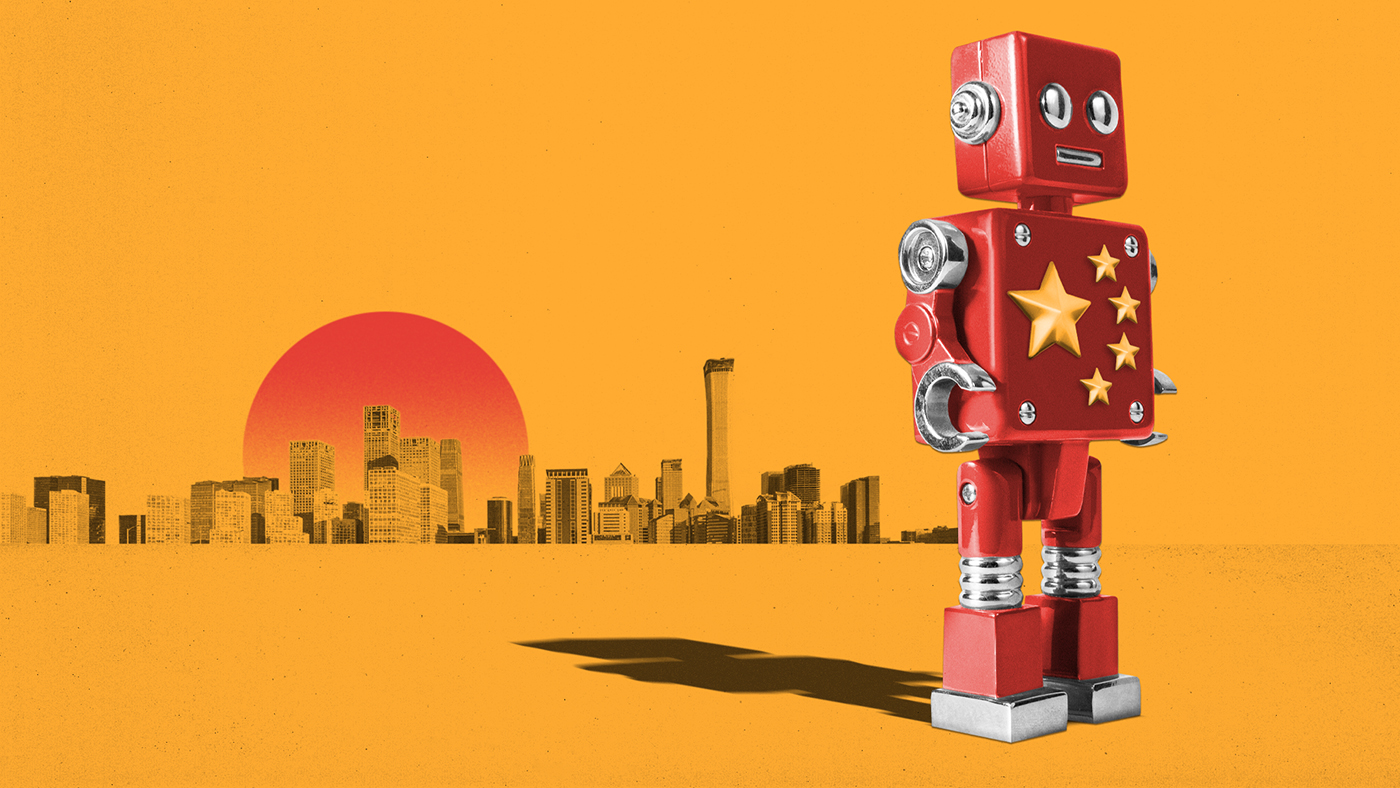Will China win the race to become the AI superpower?
AI has now become integral to Beijing’s system of state surveillance, repression and control

A free daily email with the biggest news stories of the day – and the best features from TheWeek.com
You are now subscribed
Your newsletter sign-up was successful
The country that leads the way in artificial intelligence “will become the ruler of the world”.
That was Vladimir Putin’s prediction back in 2017, when AI was largely confined to the realm of online chess – and before anyone had even heard of ChatGPT, said Malte Lehming in Tagesspiegel (Berlin). In that same year, China’s President Xi Jinping announced plans to make his nation a “global innovation hub” for AI by 2030.
And since then, Beijing has invested “tens of billions of dollars” a year in AI tech, said Bill Drexel and Hannah Kelley in Foreign Affairs (New York). It has also leveraged its “vast espionage network to try to steal foreign corporate technology secrets”. All this has paid off. China produces “more top-tier AI engineers than any other country – around 45% more than the US”, its closest competitor; and it has overtaken the US in “publishing high-quality AI research”, accounting for some 30% of citations in major AI journals in 2021. AI has now become integral to Beijing’s “system of state surveillance, repression and control”.
The Week
Escape your echo chamber. Get the facts behind the news, plus analysis from multiple perspectives.

Sign up for The Week's Free Newsletters
From our morning news briefing to a weekly Good News Newsletter, get the best of The Week delivered directly to your inbox.
From our morning news briefing to a weekly Good News Newsletter, get the best of The Week delivered directly to your inbox.
What did the papers say?
AI has also become integral to China’s military strategy, said Gabriel Dominguez in The Japan Times (Tokyo). The People’s Liberation Army (PLA) is preoccupied with developing its capabilities for “cognitive warfare”: using AI techniques to influence the minds and shape the decisions of its adversaries.
In particular, its focus is on using them to manipulate public opinion in Taiwan, which it could do by amassing vast databanks of detailed personal information and then using deep fakes and other forms of AI-generated misinformation to engineer a change in people’s perception of China’s intentions.
Running in parallel with this is the PLA’s deployment of AI on its own troops: more and more of its soldiers are being given smart sensor bracelets that it claims can continuously record their facial information and state of mind, and address any perceived psychological problems. There is still a fair amount of scepticism about how effective these techniques will prove to be, but Washington isn’t taking any chances – which is why it is restricting the sale of advanced chips for AI to China.
Understandably so, said Christy DeSmith in The Harvard Gazette (Cambridge, US). China is uniquely well placed to become an AI superpower. The technology is heavily dependent on the input and interpretation of data; and autocratic regimes “collect vast troves of it”, which they can hand over to favoured tech firms.
A free daily email with the biggest news stories of the day – and the best features from TheWeek.com
Yet when it comes to the systems known as “foundation models”, which “give generative AI” like ChatGPT its wits, America is still leading the field, said The Economist. ChatGPT was created by US startup OpenAI; Google and Meta have powerful systems of their own. And while Chinese firms have built rivals to ChatGPT, their foremost effort, Baidu’s Ernie, is “widely seen as less clever” than the best US systems. Analysts reckon China is now “two or three years behind America” in this arena, in part because so much more of the internet is written in English, giving US-built chatbots more material to draw upon.
What’s next?
Just as worrying for China is the exodus of its experts, said Gabrielle Chou in Le Monde Diplomatique (Paris). Although “almost a third of the world’s best AI researchers come from China”; only one in ten of them work there. Most have gone to work in the US, fearing that Beijing will soon tighten regulation of the sector.
Their fears are well-placed, said Matt O’Shaughnessy in the Carnegie Endowment for International Peace (Washington). In April, China’s internet regulator unveiled a draft law containing wide-ranging new rules for AI. All AI-generated content must henceforth reflect “socialist core values”; content deemed a “subversion of state power” will be banned.
The truth is that AI poses a clear threat to authoritarian regimes as well as an advantage: “deep fakes” and other AI-based techniques can easily undermine national security and social order. China might see AI as a way of advancing its quest for global supremacy, said Bill Drexel and Hannah Kelley, but just like everybody else, it will need to tread carefully.
-
 How the FCC’s ‘equal time’ rule works
How the FCC’s ‘equal time’ rule worksIn the Spotlight The law is at the heart of the Colbert-CBS conflict
-
 What is the endgame in the DHS shutdown?
What is the endgame in the DHS shutdown?Today’s Big Question Democrats want to rein in ICE’s immigration crackdown
-
 ‘Poor time management isn’t just an inconvenience’
‘Poor time management isn’t just an inconvenience’Instant Opinion Opinion, comment and editorials of the day
-
 Moltbook: The AI-only social network
Moltbook: The AI-only social networkFeature Bots interact on Moltbook like humans use Reddit
-
 Are AI bots conspiring against us?
Are AI bots conspiring against us?Talking Point Moltbook, the AI social network where humans are banned, may be the tip of the iceberg
-
 Are Big Tech firms the new tobacco companies?
Are Big Tech firms the new tobacco companies?Today’s Big Question A trial will determine whether Meta and YouTube designed addictive products
-
 Silicon Valley: Worker activism makes a comeback
Silicon Valley: Worker activism makes a comebackFeature The ICE shootings in Minneapolis horrified big tech workers
-
 AI: Dr. ChatGPT will see you now
AI: Dr. ChatGPT will see you nowFeature AI can take notes—and give advice
-
 Claude Code: Anthropic’s wildly popular AI coding app
Claude Code: Anthropic’s wildly popular AI coding appThe Explainer Engineers and noncoders alike are helping the app go viral
-
 Will regulators put a stop to Grok’s deepfake porn images of real people?
Will regulators put a stop to Grok’s deepfake porn images of real people?Today’s Big Question Users command AI chatbot to undress pictures of women and children
-
 Most data centers are being built in the wrong climate
Most data centers are being built in the wrong climateThe explainer Data centers require substantial water and energy. But certain locations are more strained than others, mainly due to rising temperatures.